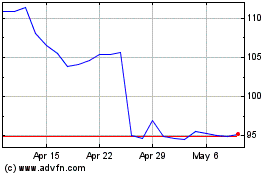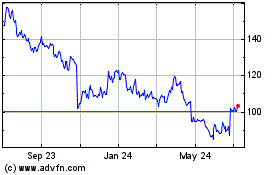By Ted Mann
LOUISVILLE, Ky. -- The new owners of General Electric Co.'s
sprawling appliance factory here say they have to slash the cost of
producing refrigerators and stoves in the face of tough, new
competitors, especially fast-growing entrants from Asia.
Those new owners: China's Haier Group.
The Asian appliance maker, which paid $5.6 billion for one of
GE's most storied businesses in early 2016, secured a tentative
labor deal this week that could avert a strike at the 6,000-worker
plant.
What remains to be seen is whether GE Appliances can thrive
without a wide-ranging conglomerate to lean on, and how deeply the
fates of workers here will change in the process.
Haier's purchase gave it access to GE's brand and catapulted it
to No. 2 in the U.S. appliance market behind Whirlpool Corp. It
also took over Appliance Park, a nearly 1,000-acre complex that
annually produces 4 million washing machines, air conditioners and
other appliances.
But the management of GE Appliances -- predominantly GE veterans
who stayed on after the sale to Haier -- say the park is losing
hundreds of millions of dollars a year, and must tighten its belt
to compete with overseas rivals like LG Electronics Inc. and
Samsung Electronics Co. that are pushing into the U.S. market.
GE Appliances and the IUE-CWA Local 83761, which represents
about 4,000 workers across the five factories at Appliance Park,
reached a tentative agreement on a new contract Monday. Union
members are expected to vote on the deal this week. It comes a
little more than one month after members handily rejected a
previous five-year deal.
"On average, when you vote a contract down, you end up with less
than what you had," said Dana Crittendon, president of Local 83761.
"We were very fortunate. It was important to get this first
contract under our belt."
Besides cutting labor costs, the company is also working to make
its factories more efficient, among steps to stem losses at the
Louisville facility.
Workers objected to some terms in the first contract agreement,
including language that would have limited bumping rights, the
ability for workers who get laid off to bump co-workers with lesser
seniority from lower positions. Company managers say the practice
is disruptive and drives up costs.
In the new agreement, which kept some of employees' bumping
rights, the company won new restrictions on overtime pay and a
lower entry wage. New full-time workers will start at $14 an hour,
compared with the current rate of $15.51. A new category of
temporary workers will begin at $12 an hour.
Haier is determined to cut costs because it paid a premium to
secure GE's business and expand its reach in the U.S. market, said
David MacGregor, an analyst with Longbow Research. "If you're
manufacturing appliances in Kentucky in dollar-denominated labor,
you've got to offset that somewhere," he said.
Having a manufacturing and distribution presence in the U.S.
gives Haier more flexibility than companies that produce goods
overseas and ship them in, he said. It avoids import tariffs and
helps the company more quickly react to changes in demand from U.S.
customers than overseas competitors.
Some Appliance Park employees with more than 20 years of service
can make as much as $25 to $40 an hour, said Bill Good, the
company's vice president of supply chain.
Over the years, wages grew out of proportion to competitors like
Whirlpool, Mr. Good said, because GE's business was effectively
hidden in its conglomerate structure. In some cases, national union
contracts with the parent helped boost wages for appliance workers
whose business wasn't doing as well as other GE units.
"We just got way out of balance," said Mr. Good, who previously
worked for Whirlpool. "I know exactly what our competitors were
doing."
He said the company planned to address personnel costs
gradually, as the older, better paid employees leave the company.
"Then we can get our wage structure right over the course of time,"
he said.
Some workers say they have been here before. Jerry Carney a
former union leader, recalled meeting with GE Chief Executive Jeff
Immelt in 2009. Mr. Immelt agreed to bring a production line back
from China if the union would agree to a wage freeze and the
introduction of a lower wage tier for new hires.
As a result, Mr. Carney and GE Appliances executives said, the
parent company eventually agreed to invest roughly $1 billion in
Louisville and expand several production lines.
But the wage tiers "divided us," said Steve Bobby, a 22-year
veteran of Appliance Park who was having a beer at a nearby pub
after a shift in Building 2, where hotel air conditioning units are
made.
Mr. Bobby said Appliance Park wages had helped him put two
children through private school. After Haier bought the company,
Mr. Bobby said, he cashed out a 401(k) account and paid off his
credit cards, truck and boat -- so he would have financial security
to vote against a deal, and risk a strike, if the company came
after senior workers for more cuts. "We're throwing the bone in
with the beans right now," he said.
He voted no on the November contract, but said he was planning
to support the deal this time around rather than risk a layoff by
voting no. "Don't need to start over at the bottom," he wrote in a
text message this week.
Executives such as Mr. Good say they think they can keep the
plant's fortunes strong if they can swing more legacy employees to
Mr. Bobby's view and bring along the lower-paid workers. "I love
American manufacturing," he said. "But I need them to kind of help
themselves a little bit."
Write to Ted Mann at ted.mann@wsj.com
(END) Dow Jones Newswires
January 12, 2017 11:22 ET (16:22 GMT)
Copyright (c) 2017 Dow Jones & Company, Inc.
Whirlpool (NYSE:WHR)
Historical Stock Chart
From Mar 2024 to Apr 2024

Whirlpool (NYSE:WHR)
Historical Stock Chart
From Apr 2023 to Apr 2024
